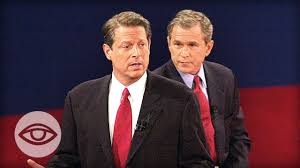Bush Or Gore Presidency Will Face Hurdles On Gay Troops
Legal and political obstacles would challenge campaign rhetoric on “don’t ask, don’t tell”
SANTA BARBARA, CA. No matter which of the major presidential contenders wins the White House on election day, the prospect of implementing campaign pledges to lift or retain the U.S. ban on openly gay soldiers is likely to face stiff challenges. Political observers and academic analysts cite a host of legal, political and logistical obstacles to carrying out the campaign promises of the Gore and Bush camps regarding “don’t ask, don’t tell.”
Vice President Al Gore has called for the repeal of the controversial ban on openly gay troops. Speaking to the Associated Press recently, he said that “as a matter of basic fairness, the policy should be changed. It is unacceptable that patriotic men and women who serve their nation with distinction are not only discharged, but suffer persecution and even violence.”
But since 1993, when the Clinton-Gore administration faced Congressional opposition to lifting the ban, the prohibition on openly gay and lesbian troops has been a matter of federal law. “It doesn’t matter what the president thinks; what Gore thinks is inconsequential to lifting the ban,” says Steve May, the state representative from Arizona who is currently undergoing discharge procedures from the Army for announcing that he is gay. If the next president attempts to change the law on gays in the military, he will almost certainly face the same fierce resistance in Congress that Clinton faced in his first term. “Gore will have a problem with a Republican senate,” says Kenneth Sherrill, Professor of Political Science at Hunter College. “They will pillory him on this issue.” May and Sherrill made their remarks in discussions Wednesday with researchers at the Center for the Study of Sexual Minorities in the Military (CSSMM), a research center at the University of California, Santa Barbara.
Gore’s proposal to liberalize the current policy was greeted with vocal resistance from military leaders early this year after the Vice President said he would require appointees to the Joint Chiefs of Staff to endorse his position on the matter. Gore would likely encounter grumbling at lower levels of operations as well; polls consistently show that majorities of military officers and enlisted personnel oppose changing the policy. Additionally, despite Gore’s record as an enlisted soldier in Vietnam, the New York Times reported recently that George W. Bush enjoys broader support among current and retired military personnel, even though he did not serve in Vietnam.
Gov. Bush has announced his support for the current policy, and has said he would not appoint anyone to the Joint Chiefs who advocated allowing gays to serve openly in the military. But the option of maintaining “don’t ask, don’t tell” is almost as rife with problems as scrapping it. Although Bush has made military readiness a centerpiece of his campaign, the gay ban he has pledged to uphold is itself a detriment to troop morale and combat capabilities, according to political analysts. Elizabeth Kier, Professor of Political Science at University of Washington, told CSSMM researchers that “don’t ask, don’t tell” can “undermine military effectiveness” and cause retention and recruitment problems. Judith Stiehm, Professor of Political Science at Florida International University, has explained that the process of investigating and discharging suspected gays and lesbians “itself causes disorder that threatens discipline and lowers morale.” Experts note that the gay ban undermines readiness not only by promoting a climate of fear, but by draining the services of needed talent. “Part of the problem is that we’re firing competent people every day,” says Steve May. As a result, “don’t ask, don’t tell” creates more of a readiness problem than it solves.
Now that twenty-three nations allow gays and lesbians to serve in the military, Bush’s commitment to maintain the U.S. ban may appear evermore inconsistent with prevailing international and domestic opinion. The U.S. and Turkey stand alone among the original members of NATO in prohibiting avowed gays from serving their country. On the home front, Bush’s position could further alienate the American public from a military that is increasingly seen as out of touch with its citizens. A recent study conducted by UCLA sociologist Laura Miller reported that 56% of the public supports allowing open gays to serve.
According to Aaron Belkin, Assistant Professor of Political Science and Director of the Center for the Study of Sexual Minorities in the Military at the University of California, Santa Barbara, the rationale behind “don’t ask, don’t tell” is not based on supporting data. “There is no evidence to support the Pentagon’s claim that gays undermine military performance,” he says. Belkin’s research on openly gay soldiers serving in foreign militaries suggests that there is no legitimate reason to continue the gay ban. The biggest obstacle to ending discrimination in the military, says Belkin, is not the requisites of military necessity, but the lack of will in the halls of Congress and the Pentagon.
